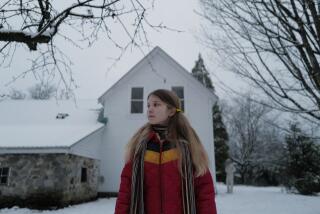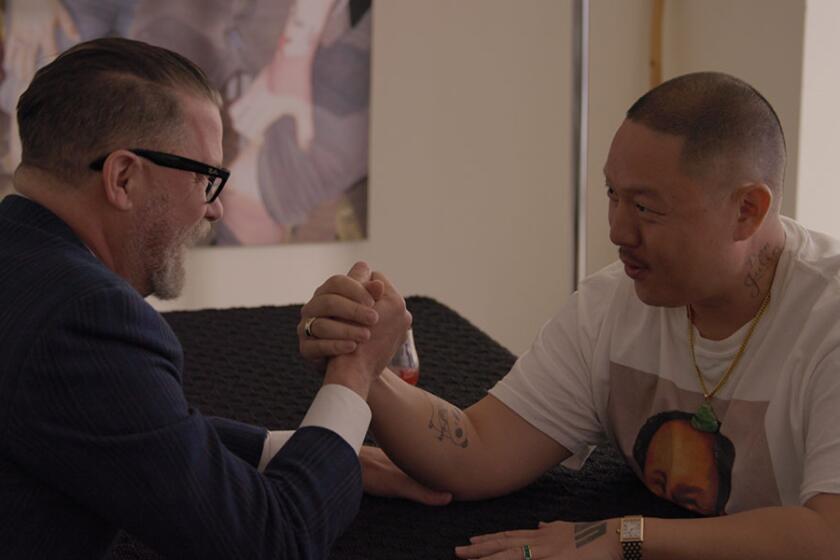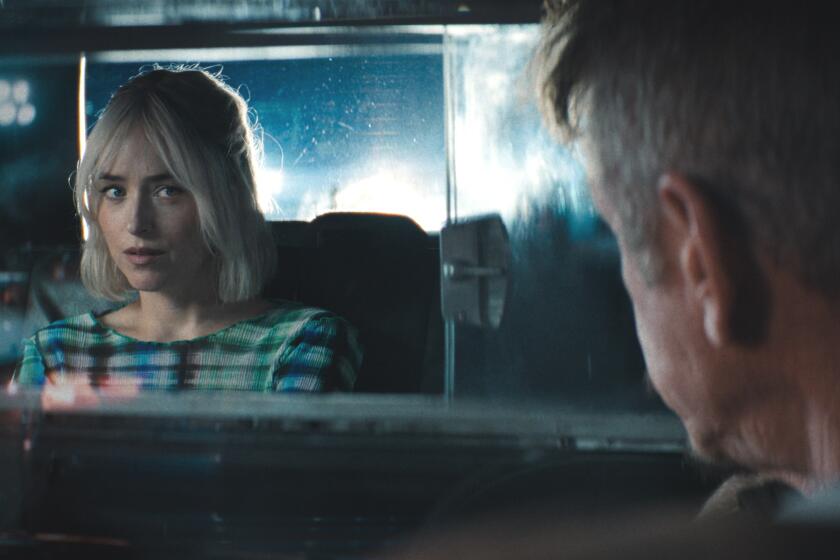Review: ‘Ismael’s Ghosts’ is a messy but vibrant drama from French director Arnaud Desplechin
In more ways than one, “Ismael’s Ghosts” immerses us in the headspace of a gloriously undisciplined movie director.
At the center of this sad, funny, sprawling and fragmented story is Ismael Vuillard (Mathieu Amalric), an unruly French filmmaker with a very strange family history. His latest picture is a thriller about a globe-hopping spy named Ivan Dédalus, a heavily fictionalized version of the younger brother he hasn’t seen in years. But the more glaring absence in Ismael’s life is that of his wife, Carlotta, who vanished 21 years earlier and hasn’t been seen or heard from since.
Complicating matters still further — or perhaps throwing them into clarifying relief — is the fact that “Ismael’s Ghosts” was written and directed by Arnaud Desplechin, himself an unruly French filmmaker who, whatever his family history may be, can make the very notion of discipline seem offensive.
His movies, which include “Kings and Queen,” “A Christmas Tale” and most recently “My Golden Days,” are restless, rambunctiously intelligent affairs that can seem punch-drunk on cinema itself. The characters ranting and storming through them are like Greek gods fallen to Earth, and Desplechin elevates their stature to further levels of grandiosity with literary allusions that are almost as showy as his visual techniques.
To identify Desplechin as Ismael’s alter ego, his real-life partner in filmmaking excess, would be both redundant and a bit imprecise. “Ismael’s Ghosts,” like much of Desplechin’s work, feels intensely personal but not exactly autobiographical (at least, I hope it isn’t, since at one point Ismael shoots his producer in the arm). It’s also worth noting that Amalric has played variations on the same character — excitable, charming, exasperating, flailing, above all haunted by the women who have passed through his life — in six of the director’s previous films, creating a sort of perpetual doppelganger effect.
Ismael Vuillard, who shares a full name if not an exact identity with the character Amalric played in 2005’s splendid “Kings and Queen,” is thus the inheritor of a rich and complicated artistic lineage: Welcome to the Desplechin Cinematic Universe. Like its predecessors, “Ismael’s Ghosts” benefits from, but doesn’t require, some familiarity with that universe. It might be more helpful for the viewer to have seen “Vertigo” and “8 1/2,” to name two other films in which the screen becomes, magnificently, an auteur’s confessional.
Ismael’s long-lost wife, Carlotta, shares her name with Carlotta Valdes, one of the spirits haunting “Vertigo.” As in that Hitchcock classic, the presumed dead have a pesky habit of not staying that way. Ismael is on a beachside retreat with his lover, an astrophysicist named Sylvia (Charlotte Gainsbourg), when they are suddenly visited by a woman who introduces herself as Carlotta (Marion Cotillard). Back at long last after her two-decade absence, she moves into their little beachhouse, while Ismael and Sylvia look on in dazed disbelief.
In addition to being a prominent star of French and American movies, Cotillard is a past member of Desplechin’s acting company; she appeared with Amalric in “My Sex Life … or How I Got Into an Argument” (1997), which playfully underscores this movie’s sense of a long-overdue homecoming. Her performance here is a bewitching piece of mischief.
At least initially, Carlotta is maddeningly coy about why she vanished, why she’s returned and what she’s been doing in the meantime. But what registers is an air of intense fragility and an openness to the unpredictability of the moment, both of which likely spurred her to leave in the first place.
Ismael, for his part, is at a loss for words, a situation he soon gets over by unleashing two decades’ worth of pent-up resentment, torment, confusion and grief in Carlotta’s direction. Thankfully, Desplechin doesn’t maintain that hysterical pitch throughout: A master at evoking domestic discord, he knows all too well that bitterness and tranquility can coexist under the same roof, sometimes within minutes of each other.
Making an exquisite case for tranquility, though she has her angry moments, too, is a completely wonderful Gainsbourg. If Ismael and Carlotta were a volatile duo years ago, then it’s the shy, dependable Sylvia, her feet firmly on the ground even with her head in the stars, who has brought balance to Ismael’s life, and who now threatens to disrupt that balance if she leaves. But leave she does, and the chaos of her departure and Carlotta’s arrival immediately spills over onto Ismael’s movie, the production of which suddenly grinds farcically to a halt.
Throughout “Ismael’s Ghosts,” Desplechin weaves in footage from that film-within-a-film, with Louis Garrel playing both the fictional, globe-trotting Ivan Dédalus and his real-life inspiration. The movie also nurtures Ismael’s fractious but ongoing relationship with Carlotta’s father, Henri Bloom (László Szabó), himself a veteran filmmaker who at one point pulls the action toward Tel Aviv and into a consideration of modern Jewish identity.
Desplechin devotees will recognize the name “Dédalus” as a recurring one in the director’s body of work, while readers of James Joyce will note both “Dédalus” and “Bloom” as obvious references to “Ulysses.” At first glance, all this busyness and self-reflexivity — to say nothing of all those playful iris shots, dissolves-within-dissolves and other tricks in Desplechin’s well-worn editorial toolkit — can seem like too much, the warning signs of a filmmaker in thrall to his own indulgence.
That hasn’t been my estimation of Desplechin’s work in the past, but it was more or less my takeaway when I saw “Ismael’s Ghosts” at the 2017 Cannes Film Festival, where it screened in a version roughly 20 minutes shorter than the 135-minute “director’s cut” now playing in U.S. theaters. Trimming those 20 minutes may have been the more commercial decision and also the more palatable one for the festival, which has a history of reining in directors and their elephantine running times.
But it was a miscalculation nonetheless, one that notably robbed key scenes, relationships and subplots of their intended impact. The movie before us may be far from perfect, but with some crucial narrative and thematic tissue restored, it plays much more clearly, and satisfyingly, as an evocation of Ismael’s emotional and psychological rupture, in his life as well as his art.
It also serves as a reminder that the messiness so vital to Desplechin’s work, sometimes dismissed as standard-issue clumsiness or incompetence, is in fact the carefully achieved product of a tricky and elusive alchemy: Pare away too much connective tissue and the whole thing collapses. It’s true that, even on a more complete viewing, not everything in “Ismael’s Ghosts” coheres. If it did, I suspect the movie would not feel quite so alive.
------------
‘Ismael’s Ghosts’
(In French with English subtitles)
Rating: R, for sexuality including some graphic nudity, language and brief strong violence
Running time: 2 hours, 15 minutes
Playing: Laemmle’s Royal Theatre, West Los Angeles; Regency’s South Coast Village 3, Orange County
More to Read
Only good movies
Get the Indie Focus newsletter, Mark Olsen's weekly guide to the world of cinema.
You may occasionally receive promotional content from the Los Angeles Times.











